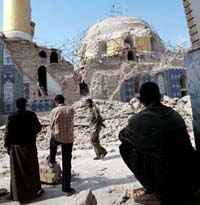Iraqi police: Insurgents destroy minarets on Golden Dome in Samarra
Insurgents on Wednesday blew up the two minarets of the famous Golden Dome Shiite shrine in Samarra, where a 2006 bombing unleashed a wave of sectarian violence that bloodied Iraq for more than a year, Iraqi police and a security official said.

The attack occurred around 9 a.m., despite a police presence at the site, officials said. Police in Samarra spoke on condition of anonymity because of the sensitivity of the matter, and a security official in Baghdad confirmed the account on the same condition.
The al-Askari shrine's dome was destroyed in February 2006 in a bombing blamed on al-Qaida-linked militants. The mosque compound and minarets remained intact, and have been guarded since then by Iraqi police and commandos.
The U.S. military headquarters in the area had no immediate information about Wednesday's attack. "We're only hearing initial reports ourselves, and we're looking into it," said Capt. Jennifer Nihill, a spokeswoman for Task Force Lightning.
The bombing could possibly unleash another wave of sectarian killings similar to the one that swept Baghdad and other areas of Iraq in the months that followed the destruction of the shrine's dome.
The sectarian killings declined beginning in February, at the start of a major U.S.-Iraqi security push to pacify Baghdad.
Since the shrine's famous golden dome was destroyed in the bombing on Feb. 22, 2006, the mosque has remained closed, the dome a mound of rubble.
The al-Askari mosque contains the tombs of the 10th and 11th imams - Ali al-Hadi, who died in 868, and his son Hassan al-Askari, who died in 874. Both are descendants of the Prophet Muhammad, and Shiites consider them to be among his successors.
The shrine also is near the place where the 12th imam, Mohammed al-Mahdi, disappeared. Al-Mahdi, known as the "hidden imam," was the son and grandson of the two imams buried in the Askariya shrine. Shiites believe he will return to Earth restore justice to humanity.
After last year's bombing, the mosque compound remained largely intact - guarded by about 60 Federal Protection Service forces and 25 local Iraqi police who keep watch on the perimeter, according to city officials.
In the immediate aftermath of the bombing, U.S. officials and others had promised to help rebuild the landmark dome, completed in 1905.
Iraq has been plagued by violence since the war started in 2003, but the carefully orchestrated 2006 explosion, in which al-Qaida assailants wearing uniforms set off two bombs at the Askari mosque, touched a nerve. The bombing unleashed Shiite militias, who ignored appeals for calm and instead attacked Sunni clerics and mosques. Nearly 140 people were killed the next day.
The United Nations reported that 34,452 civilians lost their lives in 2006 in the nearly unfathomable sectarian bloodshed that hit the capital hardest. Sunni insurgents carried out bombings almost daily, and Shiite death squads dumped dozens of corpses on the streets and in vacant lots.
Subscribe to Pravda.Ru Telegram channel, Facebook, RSS!


